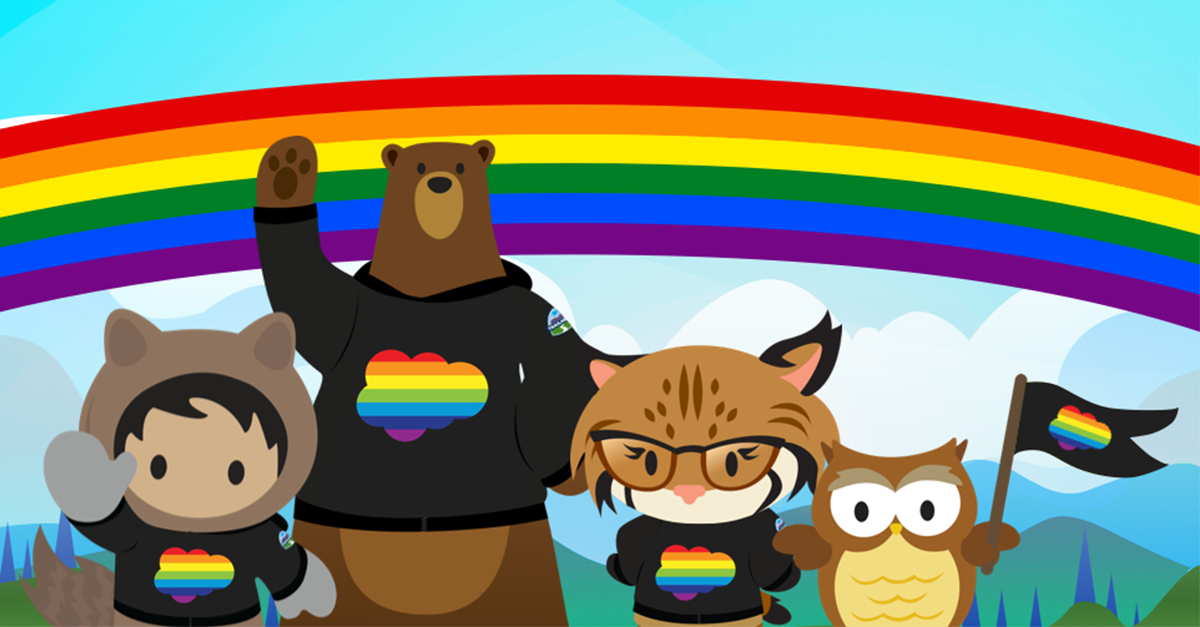When the annual Pride Parade hits the streets of Toronto on June 23, anyone attending is going to see a wide variety of floats, colourful outfits, people of diverse backgrounds — and more than 500 Salesforce employees who were encouraged to join the community through one of our Employee Resource Groups (ERG).
Starting with only a handful of people several years ago via a series of lunch n’ learns, Outforce, an ERG that brings together employees who are allies of equality in sexual orientation and gender identity, has since grown into a collective of Trailblazers. Collectively, they have educated, inspired and enriched the culture at Salesforce, both in Canada and around the world.
The efforts of Outforce have had much more than an internal impact, however. Members have contributed more than 500 hours of their time offering community service as volunteers with local non-profits, raising LGBTQ+ community awareness, and helping to create a community of allyship.
Outforce’s Positive Impact on Employees
For people like Lydia Sarkovski, who has worked at Salesforce Canada for more than eight years, helping lead Outforce has transformed her professional journey, particularly since the early days.
Amber Bellaire, who joined Salesforce Canada after moving to Toronto when she was 17 and initially studying journalism, recalled a similar transformation.
Although Salesforce — through Trailhead and its culture of developing Trailblazers — has empowered employees to start a host of focused Ohana Groups, Bellaire said the act of launching Outforce required considerable courage.
Some of the first steps included approaching executive sponsors who were already backing similar initiatives that supported the inclusion and advancement of women in the workforce. Initial meetings led to a panel during Pride Month, which was held in the Salesforce Canada office and attracted about 30 or 40 people.
Outforce’s then began to attract a wider set of Trailblazers. “It takes one hub to start another hub,” Sarkovski points out. “When Toronto started to prosper (with Outforce), we started to see other Outforce groups startup in offices around the world. You need to build a community. It doesn’t just happen.”
As the group has grown — there are now 40 to 50 people on the planning committee alone — focusing on giving back via community centres such as Toronto’s The 519, which has helped build the Outforce community internally, Sarkovski says. Perhaps more importantly, it has started an ongoing conversation about the way companies like Salesforce can welcome and support people from all backgrounds.
“I want to make sure that when I hire a LGBTQ+ employee that they feel welcome and comfortable,” she says. “Work needs to be a place where you can be yourself.”
Creating a Culture of Allies
Of course, any meaningful change not only takes time but continuous effort to ensure we continue to grow.
For those who are working in an organization that doesn’t yet have ERG’s like Outforce, Sarkovski recommends focusing on building a culture of “allyship” with others, including senior leaders who recognize the need for change. An ally is anyone who may not necessarily identify with an affinity group, but they support the community. At Salesforce, we’ve distilled our Ally Practices into four steps; asking, listening, showing up and speaking up. No matter where you are in your ally journey, we can all practice one (or all) of these steps and make a difference.
And if you want to experience a bit of that acceptance and love yourself, come join us at this month’s Pride Parade. Outforce will be among thousands of others taking more important steps forward.
Learn more about Outforce and our journey towards Equality for All.



